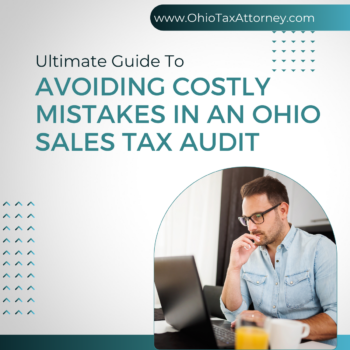
Surviving the Delinquent Tax Nightmare: Expert Insights Unveiled
- Posted by Joshua Sells
- On September 6, 2023
- IRS Back Taxes, IRS Tax Attorney, IRS Tax Debt, IRS Tax Relief
Surviving the Delinquent Tax Nightmare: Expert Insights Unveiled
An Informative Guide for Ohio Residents Who Owe the IRS Back Taxes
If you are an Ohio resident who owes the IRS back taxes, you’re not alone. Many individuals find themselves in a similar situation, facing the overwhelming challenge of dealing with delinquent taxes. We want to help you navigate through this difficult process.
In this blog post, we will provide valuable information to help you understand what are delinquent taxes, explore strategies for resolving your tax debt, and offer tips on how to prevent future tax issues.
Understanding Delinquent Taxes: A Closer Look
Delinquent Taxes 101: What is a Delinquent Tax?
Delinquent taxes refer to any unpaid taxes that are past their due date. When individuals fail to meet their tax obligations, whether intentionally or by oversight, they become delinquent tax debtors. This can result in serious consequences, including penalties, interest charges, wage garnishment, and even bank levies by the IRS.
A Glimpse into Ohio’s Tax Landscape
Being aware of the state’s tax laws, regulations, and procedures will equip you with valuable insights to effectively address your delinquent tax situation. Ohio has a progressive income tax system, which means that higher earners are subject to higher tax rates. Additionally, Ohio imposes a sales tax, estate tax, and a variety of other taxes that individuals and businesses must navigate. There is a lot of information to stay informed about.
Effective Strategies for Resolving Delinquent Taxes
- Seeking Professional Assistance: The Power of a Tax Attorney
As we learned earlier it can be very difficult to have a complete understanding of all the tax laws and regulations. This is where relying on a tax professional comes into play. A tax attorney can guide you through the complexities of the IRS tax system. They can also provide you with custom solutions based on your financial situation. Their knowledge of the tax laws and regulations can put your worries and fears aside.
- Offer in Compromise: A Light at the End of the Tunnel
An offer in compromise (OIC) is a potential solution for taxpayers burdened with overwhelming tax debt. The offer in compromise program is a solution that the IRS offers to settle the back taxes that are owed. Not just everyone qualifies for the offer in compromise program. The IRS has strict qualifications which are based on your income and assets. If you do qualify for the OIC program this can be a tremendous tax savings for you.
We had a client that owed the IRS over $800,000 and through the OIC program we were able to settle their complete tax debt for $12,000. They were so happy that they consulted a tax attorney to see what their options were.
- Installment Agreement: Taming Your Tax Debt Over Time
If you do not qualify for the offer in compromise, establishing an IRS-approved installment agreement could be your best move. This arrangement allows you to pay off your tax debt in manageable monthly installments. Once you have the installment plan established this keeps the IRS from pursuing other collection action against you. It is important to make your monthly payment on time each month and do not add future tax debt. By missing payments or by adding new tax debt that will default your payment plan with the IRS.
- Innocent Spouse Relief: Protection for the Unknowing
Married couples filing joint tax returns may face a dilemma if one spouse has unpaid tax liabilities. The IRS does offer innocent spouse relief if you meet the requirements. If one spouse was unaware of additional taxes owed due to errors on the return you should consider looking into innocent spouse relief. I would recommend seeking the advice from a tax professional to help navigate you through this process.
We were able to help Donna get relieved of $17,000 of tax debt that she was unaware of from her husband’s self-employment taxes by using innocent spouse relief.
- Penalty Abatement: Forgiveness for the Penalties Incurred
The IRS offers a couple of different penalty abatement options for getting penalties removed for late payment or filing? The two major penalty removal programs are the first time penalty abatement and reasonable cause penalty abatement. Qualifications for first time penalty abatement is the first year that there is a tax debt if the three prior years to that were filed on time and had no balances then you qualify. For reasonable cause penalty abatement they are looking for a health condition, family matter, natural disaster, or something that kept you from filing and paying your taxes on time. Reasonable cause penalty abatement is a much harder case to get approved by the IRS.
Preventing Future Tax Issues: Proactive Measures to Take
- Stay Organized: The Importance of Good Record-Keeping
One of the most effective ways to prevent future tax problems is to maintain good record keeping. To keep from having delinquent tax issues you must file and pay any balances owed by the due date. By having all of your tax documents like income statements and expense statements well organized you are setting yourself up for success when it comes to filing time.
- Regularly Review Tax Law Updates
Staying up to date on the tax laws can be very beneficial to help prevent future tax issues. The tax laws are constantly changing and could impact your tax situation in a number of ways. It can be very difficult to make sure that you are up to date on all of the tax laws and regulations, but by seeking a tax attorney or tax expert that can put your mind at ease.
- Seek Advice Before Major Financial Decisions
When you are considering making major financial decisions, such as starting a new business, investing in real estate, or getting married, I would recommend seeking professional tax advice. Consulting with someone who specializes in this field is wise. They are able to bring their expert advice to the table and potentially share pros and cons that you were unaware of, allowing you to make informed choices that align with your financial goals while minimizing tax burdens.
In Conclusion
Surviving the delinquent tax nightmare is indeed possible. By understanding what delinquent taxes are, exploring effective strategies for resolution, and taking proactive measures to prevent future tax issues you can overcome delinquent tax issues.
Remember, seeking professional help from a tax attorney and staying informed about Ohio’s tax laws are crucial steps towards resolving your delinquent taxes successfully. By implementing these expert insights, you can breathe easier, knowing that you are actively working towards overcoming the delinquent tax nightmare. Call the experts at J. M. Sells Law 330-331-7611 to help guide you through your tax situation.
